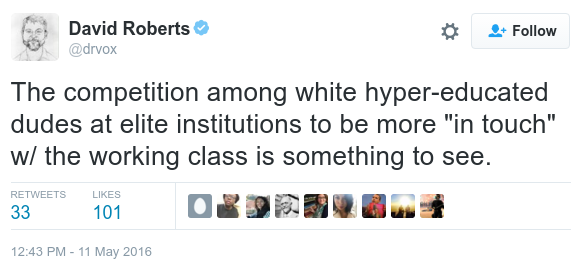
This tweet from Doctor Vox wonderfully underscores a point I’ve been making for years now: liberal discourse politics ensures a permanent erasure of the lower classes. This is so for two reasons:
- Lower class people, almost by definition, cannot engage in The Discourse. They do not have the education, credentials, or jobs necessary to do so.
- Upper class people (broadly construed) can engage in The Discourse, but if they do so as a partisan or advocate of the lower classes, they are dismissed because they are not themselves lower class. This move is the one Doctor Vox goes for in his tweet.
Together, (1) and (2) completely suffocate class-driven intrusions into The Discourse. The liberal identitarians apply their discourse politics so as to say only working class voices can speak on the working class, but it’s impossible for the working class to do so given the way media and academia work.
When I make this point, some take it to mean that we need to find ways to get more working class voices in media, i.e. find some way to break down point (1). If you could do that, it would be interesting and perhaps enlightening in some way. But there is a deeper problem that even that wouldn’t solve. The problem is that, no matter how you really do it, identity avatars that engage in The Discourse are necessarily very unlike the identities they are supposed to be representing.
A working class person that would spend their leisure time interjecting in The Discourse would be much different from your average working class person. This is vacuously true as the average working class person does not interject in The Discourse. But it is also non-vacuously true because the kind of working class person who decides to engage in the discourse also likely reads more news, is more interested in politics, and has more developed political thoughts than the average working class person.
Discourse participants are not selected by random drawings. Rather they self-select. And that self-selection destroys any chance that they could be representative.
This is true across the board. Your average woman political pundit is very unlike the average woman. She’s richer than your average woman; she’s much more educated than your average woman; she consumes very different culture and media than your average woman; and she has much more developed and committed political views than your average woman. The same is true of your average black pundit, your average gay pundit, your average Muslim pundit, and so on.
The gap between the average pundit and average person they are often said to represent is strained even further by the fact that publications often hire pundits on the basis of their politics, meaning that the only people who get through the hiring filter and into a pundit job are those who share whatever the editorial views of a publication happens to be.
Hyper-educated people claiming to be in touch with working class people is no more absurd than hyper-educated women pundits claiming to be in touch with American women at large, or hyper-educated black pundits claiming to be in touch with American blacks at large. But liberals indulge the latter fantasies and even get aggressively mad at those who don’t indulge them.
In reality, the way any pundit acquires a good insight into any particular group of people is through rigorous study and analysis of that group. Perhaps pundits could opine incisively about pundits themselves and their various internal cleavages without much study. But beyond that, they get insight into groups of people through the same methods that they would get insight into the working class, methods that Doctor Vox and many liberals seem to reject as silly when it’s convenient to do so.